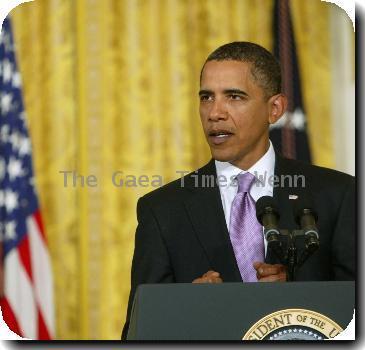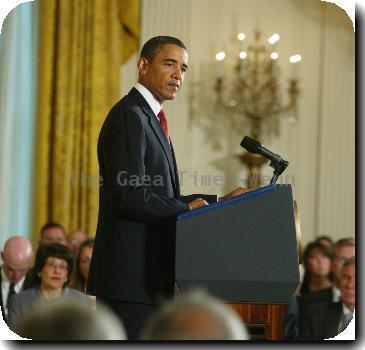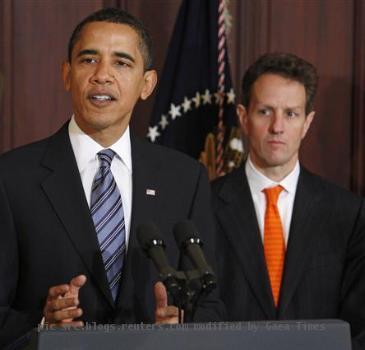Democratic woes, tough economic times create political challenge for Calif. incumbent Boxer
By Michael R. Blood, APSaturday, April 17, 2010
California rough terrain for Senate incumbent
WESTLAKE VILLAGE, Calif. — A Democrat and a woman, Helen Sargent is the kind of voter that Sen. Barbara Boxer needs this year in her drive for a fourth term in Washington.
So, what does Sargent think of taxes and the U.S. debt? Too high.
President Barack Obama, Boxer’s fellow Democrat? Very disappointing.
The Democratic Party? Needs new faces.
Boxer “has been there too long,” says Sargent, a 65-year-old travel agent from this leafy Los Angeles suburb that Boxer carried by a mere 56 votes in 2004. “All politicians have a shelf life.”
Those are troubling words for Boxer, who won in a 20-point landslide six years ago, but now faces the fight of her political career. The nation’s economic woes — particularly intense in hard-hit California — and a difficult electoral year for Democrats have created a rough challenge for the 69-year-old liberal lawmaker.
In a clear sign of her difficulties, President Barack Obama heads to Los Angeles on Monday to help raise money for Boxer, who is running about even with several potential Republican challengers, an alarming sign in the Democratic-leaning state.
The proceeds from twin fundraisers will be split between Boxer and the Democratic National Committee; ticket prices range from $100 for a reception to $17,600 for dinner with the president.
Voter frustration and outright anger is widespread in California, where the 12.6 percent unemployment rate tops the national average, home foreclosures have hit record highs and a budget crunch has led to deep cuts in the state’s college system.
In another Democratic-leaning state — Massachusetts — Republican Scott Brown captured Sen. Edward Kennedy’s Senate seat in January.
“The times are working against the kind of politician Barbara Boxer is,” said Mark DiCamillo of the independent Field Poll. Liberals are associated with the growth of government and “that is really counter to the prevailing mood in the public.”
Boxer will share a stage with a president whose popularity outshines her own in California, even as his standing in national polls has fallen. Democrats also are quick to point out that the economy is slowly improving and Republicans are tangled up in a messy and expensive primary that could leave the nominee wounded and broke. Boxer faces only token opposition in the June 8 primary.
Westlake Village, about 40 miles from downtown Los Angeles, is the kind of swing-voting community where statewide elections are often won or lost in California. Republicans hold an edge in registration here but Obama carried the city in 2008, as did Boxer in 2004.
Boxer is as beloved by her party’s left wing as she is despised by conservatives.
Her Republican rivals — state Assemblyman Chuck DeVore, businesswoman Carly Fiorina and former Rep. Tom Campbell — have pilloried her relentlessly. Fiorina’s campaign calls Boxer “the Bully of the Senate” and has depicted her in an ad as a floating hot air balloon casting ominous shadows over the state.
Random interviews with voters underscore Boxer’s problems.
Sitting outside the library Thursday, Lillian FitzGerald Burns had some advice for those who think the nation is in a rut. “Change,” she said, “takes time.” But asked about Boxer, the sprightly 82-year-old independent said her patience is running out.
Boxer “hasn’t made a significant contribution to the efforts to unscramble the problems that we inherited,” says FitzGerald Burns, who voted for Obama in 2008. Asked to name any issue that she associates with the senator’s work in Washington, she paused and stared blankly.
“I can’t.”
Polls aside, Boxer comes to the race with built-in advantages.
Democrats hold a registration edge of 2.3 million in a state with 17 million voters; Boxer captured nearly 7 million votes in 2004. The last Republican to carry the state in a presidential election was George H.W. Bush more than two decades ago. Democrats control the Legislature, hold an edge in the congressional delegation and have held both U.S. Senate seats since the 1990s.
Boxer’s campaign has $8.7 million in the bank, far more than any potential rival.
But like many incumbents, Boxer is paying a price. The mortgage crisis turned new developments into ghost towns, and the state’s unemployment rate hit a modern record in March. The number of residents fleeing the state has outstripped those coming in, and illegal immigration remains an unresolved problem.
There is a budding tea party movement eager to shake up Washington, and voter surveys suggest those voters tilt Republican. An independent Field Poll last month found Boxer running about even with DeVore, Fiorina and Campbell.
More troubling: More than half the state’s independents, the swing voters, have an unfavorable opinion of the senator.
Boxer “is part of the political system that wants to grow the government,” says John Millrany, 71, a semi-retired public relations executive and political independent who once was a Democratic Party volunteer.
“I think the government is growing too large,” he said outside the library. “The entitlements and the taxes are bound to go up.”
Tags: Barack Obama, California, Edward Kennedy, Labor Economy, Los Angeles, Municipal Governments, North America, Political Fundraising, United States, Westlake Village






